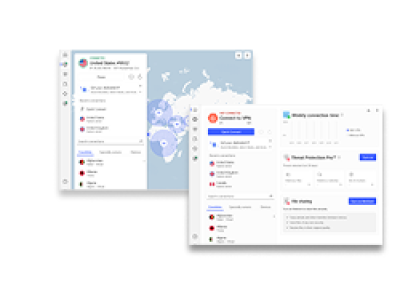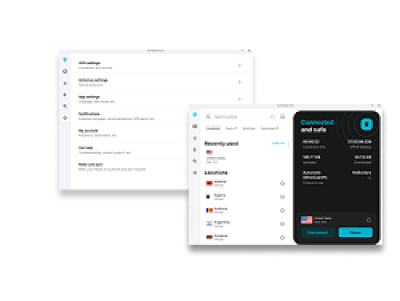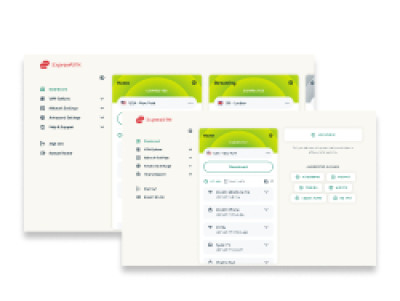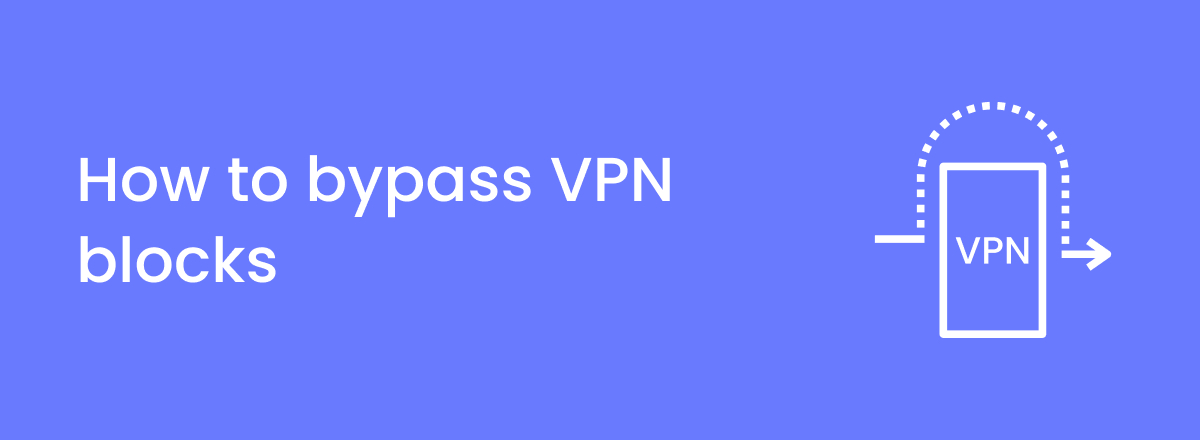VPN services are becoming more popular every day, just as attempts to block them. While using a VPN is a great way to get advantages on the internet, sometimes it can get tricky, as some websites, services, and even ISP providers are searching for ways to detect VPN users and block them.
But you shouldn’t worry – there are ways to bypass VPN blocks and use your service normally. We will provide you with the most useful hacks that will make your VPN undetectable, and your experience with a VPN will be a smooth ride.
 How to bypass VPN blocks and detection
How to bypass VPN blocks and detection
- Get an extremely secure VPN. We recommend NordVPN.
- Try different servers.
- Connect via an obfuscated server.
- Use other ports, encryption, or tunneling port.
- Get a dedicated/static IP address.
Why might VPNs be blocked?
There are a few main reasons why VPN can be blocked by a website, platform, or ISP. The most common ones are:
- Streaming restrictions
- Censorship
- School or work policy
- Copyright issues
- Fraud prevention
Streaming restrictions
VPN services are popular for watching geographically restricted content on various streaming platforms, such as Netflix or Hulu. Those platforms usually haven’t paid for licenses to show movies or TV shows in different regions, and it is against their legal agreements to access content from anywhere.
That makes companies search for ways to prevent VPN usage on those platforms, as it commonly is against their policies. Fortunately, even if you get caught using a VPN, you won’t get banned – you will get only an error, and unrestricted content will be available to you without VPN services.
Censorship
Some countries, such as China, have strict rules for internet usage – they use online censorship to limit the information citizens can get on the internet. One of the most known examples is the so-called Great Firewall of China which censors websites, keywords, and even the types of activity online.
As it won’t let anyone in the country access social media websites, such as Facebook or Twitter, governments are aware that citizens can use a VPN to bypass the rules and block VPNs from their markets. Bear in mind that in some countries, VPNs are illegal, so you should always pay attention to the laws of the country that you are visiting.
School/work policy
The block of specific websites, such as social media, news, or entertainment, is becoming more common in workplaces or schools. It is called a productivity block that is supposed to help for better concentration and won’t allow even simple services, such as listening to music on Spotify.
It can block VPN services as well as it is a popular way to bypass restrictions. On top of that, with a VPN, network administrators can’t see and monitor what you are browsing and your history, which is another reason to block it.
Copyright issues
Although VPN itself is legal, breaching copyright terms isn’t. VPNs are one of the ways to protect your IP address and make you untraceable online, thus, they are common among torrent users. While it can help you download files, some may be copyrighted and violate the laws. That is the reason why copyright holders are trying to find a way to stop illegal activity and block VPN services altogether.
Fraud prevention
Financial services usually don’t allow VPN usage to prevent fraud and money laundering. If a website is blocking VPN, you won’t be able to proceed with your transactions while connected to a virtual private network, and in some cases, your account can get blocked for trying to do so.
Best VPNs to bypass blocks
If you are wondering how to get around a VPN block, there are a few crucial features that you should look for: a wide variety of servers, obfuscated servers, and a lot of tunneling protocols. You can find all those features in the most secure services. Here is a list of the most reliable ones:
1. NordVPN – best VPN to bypass any block


- Effortlessly bypasses geo-blocks
- Servers in 129 countries
- 92% speed retention rates
- Free trial only on Android
If you are searching for the most secure VPN service that has all the essential features to bypass VPN blocks and more, this is the one for you. It outstands other services with its ability to become undetectable and safe online.
NordVPN is well known for its extreme safety so your data and privacy will never be revealed to anyone. It has many privacy features, thousands of servers scattered around the globe, obfuscated servers, and plenty of tunneling protocols. With those features, you won’t have any trouble getting around any restrictions. In addition, it offers a dedicated IP address for more advanced cases for a reasonable price starting from from $3.39/month.
2. Surshark – fast service to make you undetectable online


- Easily bypasses geo-blocks
- Affordable plans
- Unlimited connections
- Based in a 14-Eyes alliance country
Surfshark is mainly known for its user-friendly price and interface, but you should consider it for its ability to bypass VPN blocks as well. It is safe, fast, and offers all the crucial features to browse undetected.
Together with a lot of servers, obfuscated servers, and many protocols, it offers you the latest technologies and specialized options. You will be able to unblock any streaming service or download torrents in a few clicks. This VPN has an ad-blocker and even a feature that will allow you to use VPN while banking – these are features that should make you consider getting this provider’s service.
3. ExpressVPN – high-secure service to unblock restricted sites


- Bypasses VPN blocks without issues
- 89% average speed retention rates
- 3,000+ servers in 105 countries
- Premium pricing
ExpressVPN shines on its military-grade encryption that won’t fail against VPN blockers’ efforts. It is fast, safe, and reliable – everything you want from a VPN service.
It has a huge network of servers, so you will find one that will access blocked content. This VPN ensures that you are in safe hands with AES 256-bit encryption and StealthVPN technology. It is not only safe but also convenient as you won’t need anything more than to press a button, because it will automatically tweak protocols and change servers if you stumble upon any restrictions.
How to get around a VPN blocks
There are a few ways how to bypass VPN detection and blocks. Here are the most common ones that will make you undetectable:
Change server, country, or VPN
If you stumble upon a VPN block, the first and easiest step should be trying another server or changing location. That’s why you should pick a VPN with a wide variety of servers and countries you can choose from – the more servers a VPN offers, the more chances you have to go around the restrictions. If this doesn’t help, you may consider changing your VPN service to a more secure one that will allow bypass restrictions.
Use an obfuscated server
The obfuscated server is a specialty VPN server that allows you to appear as using a regular internet connection. The obfuscation technology (also called ‘stealth VPN’) is made to hide the fact that you are using VPN. It works by scrambling your data or adding a layer to your encryption to make it unrecognizable by the algorithm. Some find open ports and change them regularly to avoid blocks.
Top VPN providers have this technology to hide any trace that your traffic is encrypted – that’s why you should look for VPNs with this feature. While it can sound like a complicated way, it is effortless to use – just find a switch, and you will be undetectable.
Change port, encryption, or tunneling protocol
If your VPN got blocked, it could have happened when using a particular tunneling protocol. You might fix that by choosing a different one in your VPN’s settings – in most applications, it’s as simple as pressing a button. The primary advice is to use new or less popular VPN protocols as they might not be blocked yet.
Websites or platforms block ports used by tunneling protocols or encryption. In this case, you need to manually select a different option that is not associated with the VPN and may not be restricted.
Dedicated/static IP address
You may use a dedicated (or static) IP address when searching for ways to bypass blocked VPNs. Most top VPN providers are offering this feature as a paid extra.
A static IP address will be exclusively yours – as websites or platforms are looking for repetitive IP addresses, this will draw less attention and suspicion to be blocked. It can also prevent CAPTCHA security alerts; thus, this is a great way to bypass and prevent blocks.
Switch to mobile data
It sounds like an easy solution, but simply switching to mobile data can bypass VPN blocks when using work or school networks with certain restrictions. You can connect your device to a mobile hotspot and use VPN as usual in seconds. As you won’t be using Wi-Fi anymore, do not forget to watch your data to avoid any extra fees.
Redirect your VPN traffic through an SSL/SSH tunnel
One more sophisticated way to bypass a VPN block is by creating an SSL or SSH tunnel. That will add a layer to your encryption, route your internet traffic through different encryption connections, and make your VPN usage undetectable for firewalls. Keep in mind that this method can slow down your internet connection, but it’s one of the advanced ways to bypass restrictions.
Most common VPN block types
There are various ways how websites, platforms, or ISP, are blocking VPNs. The most common blocker methods are IP block, port blocking, ISP block, and DPI.
IP block
Websites, ISPs, or platforms are looking for publicly listed IPe associated with VPN and preventing them from accessing content. The most common and easy way of VPN blocking is blacklisting all known VPN IP addresses. Streaming platforms like Netflix or Hulu commonly use it.
If a specific IP or a group of IPs are linked to unusual activities, that can also lead to blocking. In normal circumstances, one IP address should be used by one device, but in the VPN case, it could be used by thousands of users simultaneously. That draws attention and causes VPN blocks.
You should try connecting to a different server or changing location to avoid this. If you want to be extra safe – buy a dedicated IP address that won’t draw any attention to your activity online.
ISP block
ISP can detect and block VPN connections because they recognize IP addresses or ports associated with a particular virtual network service provider. Is your ISP blocking VPN? If you use a VPN but can’t connect to the internet or a specific website, your ISP (Internet Service Provider) might restrict access. You can bypass this issue by switching to a different port, encryption, or server.
Port blocking
VPN uses specific connection ports that certain networks can block. If the firewall recognizes that port, you cannot connect to a server while using a VPN. As the most common VPN ports are known, all that is left to do for a website or network is to monitor those ports and block unwanted traffic.
If you stumbled across port blocking, you should switch to a different tunneling protocol, change your VPN's ports, or connect to an obfuscated server.
Deep Packet Inspection
Some countries and specific ISPs use Deep Packet Inspection (DPI), which is used for advanced censorship and internet shutdowns. To understand how this works, you should know that all your internet traffic can be broken down into small blocks, known as packets. DPI examines those packets and checks your type of traffic – metadata can reveal the usage of the VPN.
To bypass restrictions by DPI, you should use different VPN encryption or protocol or an obfuscated server.
Free VPNs to bypass VPN blocks
While you can try finding the best free VPN, most free ones lack essential features to bypass VPN blocks and keep you safe online. As many users use it, IP addresses are way more likely to get blocked because of suspicious activity online. Usually, it offers fewer safety features, and in some cases, can use outdated software which won’t help get around restrictions.
While Proton VPN or Windscribe are considered decent VPNs, using them, you won’t be able to customize settings as easily as with the premium ones. They have fewer servers worldwide and can noticeably slow down your internet connection.
In the case of free VPNs, you can risk your data being leaked and attacked with ads. If you want to try all the premium VPN’s advantages risk-free, you can do that easily with the top VPNs, like NordVPN or Surfshark, that offer free trials and a 30-day money-back guarantee.
To sum up
If you bumped into a VPN block, it doesn’t mean you aren’t allowed to use it properly anymore. Your school or work network, streaming platforms, financial services, or even ISP might constantly be trying to block your access while connected to a VPN server. Usually, it is done by blocking IP addresses, ports, or in some advanced cases, by DPI technologies. Luckily, there are tricks to bypass the VPN block and get the virtual private server’s advantages as usual.
The most important thing is to choose a secure and reliable VPN service with all the features to get around any block. Once you have done this, you just need to know a few options to manage your VPN application: change server or connect to an obfuscated one, switch security protocols, encryption, or port. With advanced services, you can get a dedicated IP address that will help you stay undetected online. These options are the solution to bypass VPN blocks safely and easily.
Frequently asked questions
Work or school often have firewalls to protect you from doing anything unproductive. If you have stumbled upon restrictions, the fastest way to use your VPN service is typically to switch your internet connection to the mobile hotspot.
You need to change your VPN service settings if you run into a VPN block on your phone. Choose a different server or pick another security protocol in the options of your app, and you should be able to bypass restrictions. If that doesn’t help, you may need to find a safer VPN provider.
Free VPNs usually aren’t a good and reliable option to bypass a VPN block. Most of them lack essential features, such as a wide variety of servers, obfuscated servers, or the ability to change protocols or ports manually, to keep you safe online. Further, many users make blocking access to chosen VPN IP addresses and ports easier for companies.


